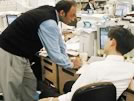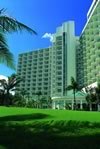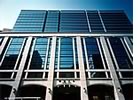- Home
- Company Profile
- Historical Background
- History
- 1984-2001
1984-2001
- 1984-1992
Increase in the number of Group companies and preparation for the 21st century - 1992-2001
an Era of Global Partnership
1984-1992 Increase in the number of Group companies and preparation for the 21st century


The Company has been streamlining its corporate structure since the second oil crisis to continue developing its business. For example, we have shifted construction of new ships and operation of company ships to overseas affiliates to maintain internationally competitive shipping costs. We introduced new technologies into our ship operations and maritime transportation, and constructed state-of-the-art ships that operate with fewer crew members. We further reduced the number of our employees by taking advantage of the Emergency Measures for Employment of Oceangoing Seafarers, an optional voluntary retirement system, and by mixing Japanese and foreign crew members under the New Maru Ship system. This reduction in employees has greatly contributed to more efficient management.
Meiji Shipping Co., Ltd. the core of the shipping business for our Group, was founded in 1984. They not only own and operate the Company fleet but also form overseas affiliates, build new ships, and purchase and operate foreign ships. We also enter into contracts with major domestic and foreign shipping companies, trading companies and oil companies for chartering and business management. This further increases the shipping business of the Group. Meiji Real Estate Co., Ltd., one of the Group companies, owns, trades and leases real estate, in particular office buildings. It constructed the Shin ('New') -Meikai Building on Kaigan ('Seaside') Street in Kobe's Chuo Ward in 1984. Meiji Real Estate Co., Ltd. plans to further expand its business to meet the diverse needs of people today.
Meiji Real Estate Co., Ltd. purchased for leasing the Meikai Kyobashi building, a new 8-storied building located in the Kyobashi area of Tokyo's Chuo Ward. This building was purchased to further stabilize the business management base, and diversify the business.
In the field of ship management and operation, in which the Company has superior expertise and long been operating for some years now. It was renamed to MMS Co., Ltd. in November 1985. The number of staff has since been increased. MMS Co., Ltd. now has a perfect system to meet customers' diverse needs speedily and accurately. The International Convention for the Safety of Life at Sea (SOLAS) was revised in 1994, and the ISM Code took effect in 1998. The Company established its Safety Management System in conformity with the ISM Code, for which the Company acquired certification from the Nippon Kaiji Kyokai. We will pursue all possible measures to enhance safety because we believe that safe operations and efficiency are the cornerstone of high-quality services.
Meikai Kosan K.K. constructed its own office building (Surfeel Naka-meguro) in the Kami-meguro area of Tokyo's Meguro Ward in April 1991. This Group company operates and manages office buildings, and imports and markets custom kitchen furnishings. The Tokyo Headquarters of Meiji Shipping Group Co., Ltd. and all Meikai group companies located in Tokyo have since moved to this new building, further enriching the Group's wide range of business functions.
The most recent event of the Group's business diversification was the July 1992 opening of the Laguna Garden Hotel in Ginowan City in Okinawa Prefecture. Ginowan Kanko Kaihatsu, one of the Group's affiliates, owns the land and hotel building while the hotel operations are managed by Laguna Garden Hotel Inc. This hotel is a member of the ANA Hotel group.
Meiji Shipping Co., Ltd. the core of the shipping business for our Group, was founded in 1984. They not only own and operate the Company fleet but also form overseas affiliates, build new ships, and purchase and operate foreign ships. We also enter into contracts with major domestic and foreign shipping companies, trading companies and oil companies for chartering and business management. This further increases the shipping business of the Group. Meiji Real Estate Co., Ltd., one of the Group companies, owns, trades and leases real estate, in particular office buildings. It constructed the Shin ('New') -Meikai Building on Kaigan ('Seaside') Street in Kobe's Chuo Ward in 1984. Meiji Real Estate Co., Ltd. plans to further expand its business to meet the diverse needs of people today.
Meiji Real Estate Co., Ltd. purchased for leasing the Meikai Kyobashi building, a new 8-storied building located in the Kyobashi area of Tokyo's Chuo Ward. This building was purchased to further stabilize the business management base, and diversify the business.
In the field of ship management and operation, in which the Company has superior expertise and long been operating for some years now. It was renamed to MMS Co., Ltd. in November 1985. The number of staff has since been increased. MMS Co., Ltd. now has a perfect system to meet customers' diverse needs speedily and accurately. The International Convention for the Safety of Life at Sea (SOLAS) was revised in 1994, and the ISM Code took effect in 1998. The Company established its Safety Management System in conformity with the ISM Code, for which the Company acquired certification from the Nippon Kaiji Kyokai. We will pursue all possible measures to enhance safety because we believe that safe operations and efficiency are the cornerstone of high-quality services.
Meikai Kosan K.K. constructed its own office building (Surfeel Naka-meguro) in the Kami-meguro area of Tokyo's Meguro Ward in April 1991. This Group company operates and manages office buildings, and imports and markets custom kitchen furnishings. The Tokyo Headquarters of Meiji Shipping Group Co., Ltd. and all Meikai group companies located in Tokyo have since moved to this new building, further enriching the Group's wide range of business functions.
The most recent event of the Group's business diversification was the July 1992 opening of the Laguna Garden Hotel in Ginowan City in Okinawa Prefecture. Ginowan Kanko Kaihatsu, one of the Group's affiliates, owns the land and hotel building while the hotel operations are managed by Laguna Garden Hotel Inc. This hotel is a member of the ANA Hotel group.
1992-2001 an Era of Global Partnership

The Company has continued to expand and replace its fleet in response to change in the economic environment of the time. The expansion of the fleet began in 1992 and had a particularly large impact on the Japanese shipping industry because of its bold plan.
A product tanker was completed in 1992, a crude oil tanker in 1993, and four bulk carriers and one PCC from 1994 to 1995. A double-hull VLCC, the first such ship for a Japanese shipping company, was completed in 1996. A bulk carrier, a special chip vessel and a double-hull product tanker were constructed in 1997. This resulted in a lower average age for the ships of the fleet. A double-hull product tanker was construction in 1998, and the No.2 double-hull VLCC in 1999.
Environmental issues, which have become increasingly important throughout the world, have been duly considered in the constructed of our ships. We provide perfect solutions for the needs of our era with our high-quality ships while protecting the environment. We built a PCC, a double-hull product tanker, and a bulk tanker in 2000. After these ships have completed, more than 70% of our ships will be under 8 years old on average. Ship age is an indicator of the safety of a ship. Safety and efficiency have been the focus of the Company's business since its foundation.
With regard to the administrative side of the business, we set up a ship owning company in Singapore in 1995 to establish an integrated control system and cope with international shipping regulations that become increasingly stricter year after year. We further established a new ship management company also in Singapore in 1997 to strengthen the base of our overseas business.
The office building leasing business of our Group suffered a great loss when the Meikai Building was severely damaged in the Kobe Earthquake that occurred in the early morning on January 17, 1995. This was a real tragedy because the building had been beloved by all people in Kobe for its historical significance and importance. The building had been internationally renowned as the emblem of the shipping industry in the Kansai district since 1921.The building was so severely damaged that there was no alternative but to dismantle and remove it, bringing to a close its glorious history.
Meikai Building _ KobeOn March 28 of the following year, the No.1 (amongst Kobe city) reconstruction project started. The new building was completed in January 1998 with integrated office and shop space. It symbolizes an era of hope for the 21st century, and stands in harmony with the historical environment of the Kobe Settlement district.
With its refined atmosphere and distinctive character, the building is already much praised by local residents. We are sure that the new building will come to be beloved by the local people just as the old Meikai Building was.
As Japan is becoming increasingly internationalized, we are seeing sharp foreign exchange fluctuations, financial crises and other external instabilities. Mass media are frequently using the term global standard. In the shipping industry, which forms a single global market by its very nature, our Group has faced and overcome a number of difficulties in the seas of free competition by following our aggressive management policies and continuing our traditional steady progress.
Global partnerships with foreign companies or those in different industries and the attendant external problems that must be conquered are a valuable process through which the shipping industry, the core business of the Company, will be eventually restructured to suit the internationalized country that Japan is becoming.
A product tanker was completed in 1992, a crude oil tanker in 1993, and four bulk carriers and one PCC from 1994 to 1995. A double-hull VLCC, the first such ship for a Japanese shipping company, was completed in 1996. A bulk carrier, a special chip vessel and a double-hull product tanker were constructed in 1997. This resulted in a lower average age for the ships of the fleet. A double-hull product tanker was construction in 1998, and the No.2 double-hull VLCC in 1999.
Environmental issues, which have become increasingly important throughout the world, have been duly considered in the constructed of our ships. We provide perfect solutions for the needs of our era with our high-quality ships while protecting the environment. We built a PCC, a double-hull product tanker, and a bulk tanker in 2000. After these ships have completed, more than 70% of our ships will be under 8 years old on average. Ship age is an indicator of the safety of a ship. Safety and efficiency have been the focus of the Company's business since its foundation.
With regard to the administrative side of the business, we set up a ship owning company in Singapore in 1995 to establish an integrated control system and cope with international shipping regulations that become increasingly stricter year after year. We further established a new ship management company also in Singapore in 1997 to strengthen the base of our overseas business.
The office building leasing business of our Group suffered a great loss when the Meikai Building was severely damaged in the Kobe Earthquake that occurred in the early morning on January 17, 1995. This was a real tragedy because the building had been beloved by all people in Kobe for its historical significance and importance. The building had been internationally renowned as the emblem of the shipping industry in the Kansai district since 1921.The building was so severely damaged that there was no alternative but to dismantle and remove it, bringing to a close its glorious history.
Meikai Building _ KobeOn March 28 of the following year, the No.1 (amongst Kobe city) reconstruction project started. The new building was completed in January 1998 with integrated office and shop space. It symbolizes an era of hope for the 21st century, and stands in harmony with the historical environment of the Kobe Settlement district.
With its refined atmosphere and distinctive character, the building is already much praised by local residents. We are sure that the new building will come to be beloved by the local people just as the old Meikai Building was.
As Japan is becoming increasingly internationalized, we are seeing sharp foreign exchange fluctuations, financial crises and other external instabilities. Mass media are frequently using the term global standard. In the shipping industry, which forms a single global market by its very nature, our Group has faced and overcome a number of difficulties in the seas of free competition by following our aggressive management policies and continuing our traditional steady progress.
Global partnerships with foreign companies or those in different industries and the attendant external problems that must be conquered are a valuable process through which the shipping industry, the core business of the Company, will be eventually restructured to suit the internationalized country that Japan is becoming.

